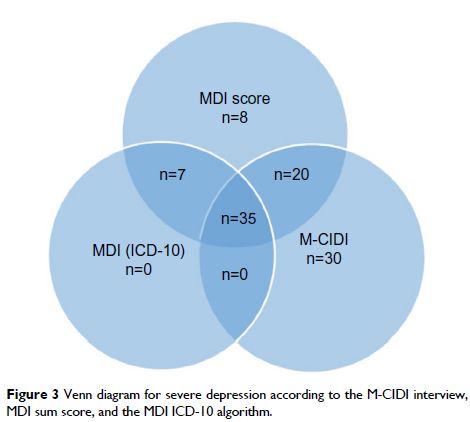109451
论文已发表
注册即可获取德孚的最新动态
IF 收录期刊
- 3.4 Breast Cancer (Dove Med Press)
- 3.2 Clin Epidemiol
- 2.6 Cancer Manag Res
- 2.9 Infect Drug Resist
- 3.7 Clin Interv Aging
- 5.1 Drug Des Dev Ther
- 3.1 Int J Chronic Obstr
- 6.6 Int J Nanomed
- 2.6 Int J Women's Health
- 2.9 Neuropsych Dis Treat
- 2.8 OncoTargets Ther
- 2.0 Patient Prefer Adher
- 2.2 Ther Clin Risk Manag
- 2.5 J Pain Res
- 3.0 Diabet Metab Synd Ob
- 3.2 Psychol Res Behav Ma
- 3.4 Nat Sci Sleep
- 1.8 Pharmgenomics Pers Med
- 2.0 Risk Manag Healthc Policy
- 4.1 J Inflamm Res
- 2.0 Int J Gen Med
- 3.4 J Hepatocell Carcinoma
- 3.0 J Asthma Allergy
- 2.2 Clin Cosmet Investig Dermatol
- 2.4 J Multidiscip Healthc

The criterion validity of the web-based Major Depression Inventory when used on clinical suspicion of depression in primary care
Authors Nielsen MG, Ørnbøl E, Bech P, Vestergaard M, Christensen KS
Received 21 January 2017
Accepted for publication 16 March 2017
Published 6 July 2017 Volume 2017:9 Pages 355—365
DOI https://doi.org/10.2147/CLEP.S132913
Checked for plagiarism Yes
Review by Single-blind
Peer reviewers approved by Dr Akshita Wason
Peer reviewer comments 2
Editor who approved publication: Dr Irene Petersen
Background: The Major Depression Inventory (MDI) is widely used in Danish general
practice as a screening tool to assess depression in symptomatic patients.
Nevertheless, no validation studies of the MDI have been performed. The aim of
this study was to validate the web-based version of the MDI against a fully
structured telephone interview in a population selected on clinical suspicion
of depression (ie, presence of two or three core symptoms of depression) in
general practice.
Materials and
methods: General practitioners (GPs) invited
consecutive persons suspected of depression to complete the web-based MDI in a
primary care setting. The validation was based on the Munich-Composite
International Diagnostic Interview (M-CIDI) by phone. GPs in the 22 practices
in our study included 132 persons suspected of depression. Depression was rated
as yes/no according to the MDI and M-CIDI. Sensitivity, specificity, and positive
predictive value of the International Classification of Diseases, Tenth
Revision (ICD-10) algorithms of the MDI were examined.
Results: According to the M-CIDI interview, 87.9% of the included
population was depressed and 64.4% was severely depressed. According to the MDI
scale, 59.1% of the population was depressed and 31.8% was severely depressed.
The sensitivity of the MDI for depression was 62.1% (95% confidence interval
[95% CI]: 52.6–70.9) and the specificity was 62.5% (95% CI: 35.4–84.8). The sensitivity
for severe depression was 42.2% (95% CI: 30.6–52.4) and the specificity was
85.1% (95% CI: 71.7–93.8). The receiver operating curve showed an area under
the curve of 0.66 (95% CI: 0.52–0.81) for any depression and of 0.72 (95% CI:
0.63–0.81) for severe depression.
Conclusion: The MDI is a conservative instrument for diagnosing ICD-10 depression in
a clinical setting compared to the M-CIDI interview. Only a few false-positive
diagnoses were identified when the MDI was used on clinical suspicion of depression.
Keywords: Major Depression Inventory, depression, criterion validity, M-CIDI
interview, diagnosing
